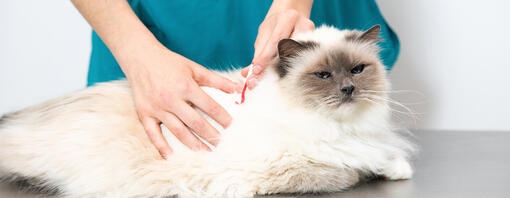
Compared to dogs, cats might seem like low-maintenance, independent pets that don’t need much fuss. But, as any cat owner will know, they require just as much of your care and attention, especially when it comes to their health. They might not always show it, but they're counting on us to keep them healthy, happy and purring away!
Being able to recognise the signs and symptoms of a sick cat is important for early intervention and can be the difference between a simple vet visit and a more serious, costly and even life-threatening situation. In this guide, we'll explore the common signs of illnesses in cats, what to do if you suspect your cat is unwell, along with tips and advice on how to keep your furry friend healthy and happy.
Common Signs of a Sick Cat
Cats are the experts in hiding pain and illness to avoid showing vulnerability. There are however many cat illness symptoms to watch out for and here are some of the most common ones.
Changes in Appetite
One of the signs that your cat may be sick is a change in their eating habits. If your cat is suddenly eating less or even more than usual, it could be a sign of various health issues. An increase in appetite might indicate diabetes or hyperthyroidism, while a decrease could be related to stress, dental disease, pain, or cancer. While we can all go off our food for a day, it's important to monitor these changes closely and consult with a vet if the changed appetite continues for more than a day or two. Early diagnosis and treatment are important for all these conditions, so don’t put off talking to your vet.
A decrease in appetite in an outdoor cat can however be an indication they are being fed somewhere else or else catching their own snacks – or if your cat regularly tends to be more of a fussy eater, you can check out our guide on how to feed your fussy cat.
Behavioural Changes
Cats are creatures of habit, and most owners know their cat and their personality well, so any obvious change in their behaviour could be a cause for concern. Often this is the most obvious symptom that your cat is unwell.
A playful cat that becomes lethargic or starts to hide more often or avoids contact should raise a red flag. Increased aggression or vocalisation excessive grooming that leads to bald patches and/or hair loss, or a sudden decrease in grooming and self-care can also be signs of pain or illness.
These changes in behaviour could indicate stress, anxiety or fear, or else illness, disease or pain. If you notice your cat behaving differently, especially if these behaviours have started fairly suddenly, consult your vet straight away.
Physical Changes
Physical changes in your cat's appearance or body can also indicate health problems, especially when cats enter their senior age. If your cat is losing or gaining weight rapidly, has a dull or patchy coat, or if you notice any unusual discharge from their eyes or nose, it's time to speak to a vet as this could be signs disease including cat flu.
Changes in Bathroom Habits
A cat's litter box habits can tell you a lot about their health. Be alert to any changes in the frequency of urination or defecation, straining, or changes in the appearance of urine or faeces. These signs can indicate urinary tract infections, kidney problems, or digestive issues. For example, blood in the urine or stools, or unusually strong-smelling urine, should never be ignored. If you see any of these changes, it's important to contact your vet immediately to determine the underlying cause and provide appropriate treatment.
Other Signs to Watch Out For
- Vomiting: While cats frequently vomit fur balls, more persistent vomiting could indicate anything from a simple upset stomach to something more serious like infections, pancreatitis, inflammatory bowel disease, or even having ingesting toxins or blockages in the digestive tract. Contact your vet straight away for advice.
- Diarrhoea: Occasional loose stools might not be a cause for immediate concern, but persistent diarrhoea can lead to dehydration and may signal infections, parasites, food intolerances, inflammatory bowel disease, pain, or other illnesses.
- Persistent Coughing: A cough could be due to an upper respiratory infection, asthma, allergies, or even heartworm disease. In rare cases, it could indicate a more serious lung condition. Contact your vet.
- Sneezing: Occasional sneezing is normal, but frequent or violent sneezing, especially if accompanied by discharge from the eyes or nose, can suggest an upper respiratory infection, allergies, or even a foreign body in the nasal passages.
- Difficulty Breathing (Dyspnoea): This is a serious symptom that requires immediate veterinary attention. It can be a sign of asthma, heart failure, pneumonia, fluid in the lungs, or an obstruction in the airways.
It's important to remember that these are just potential causes, and a proper diagnosis can only be made by a vet. If your cat shows any of these symptoms, especially if they are new, severe or persistent, seek veterinary care immediately.
What to Do If You Suspect Your Cat is Sick
Immediate Attention
Some symptoms require immediate veterinary attention. If your cat is having difficulty breathing, experiencing seizures, or showing signs of acute pain, consider it an emergency and seek veterinary care right away.
Consult Your Vet
For less severe issues getting your vet’s advice is important for your cat’s health. Your vet can perform various tests to get a diagnosis and develop a treatment plan to help your cat get better. Don't wait until it's too late; early detection can save your cat's life.
Preventing Common Cat Illnesses
- Prevention is always better than cure. There are several steps you can take to ensure your cat remains healthy:
- Regular Vet Check-ups: Schedule annual or bi-annual check-ups with your vet to catch any potential issues early.
- Vaccinations: Keep your cat up to date with their vaccinations to protect them against common diseases.
- Balanced diet: Feed your cat a balanced diet, with cat food suited for their age, health status, and lifestyle.
- Clean environment: Maintain a clean-living environment, including their litter box, to prevent the spread of diseases.
- Provide plenty of enrichment opportunities so your cat can stay physically and mentally active.
- Manage stress: Cats are very sensitive to stress, which can weaken their immune system. Try to minimise changes to their environment and routine. Owning a cat is a joy and they add so much to your life, but it is important to know your own individual cat, be aware what is normal for them in terms of behaviour, eating, self-care, play and activity levels. By doing this, you will see any changes that may happen in your cat’s behaviour or physical health.
- Seek your vet’s advice if you see any changes – and when in doubt, trust your instincts and seek professional advice. With proper care and your love and attention, your cat can enjoy a long, happy, and healthy life by your side.




